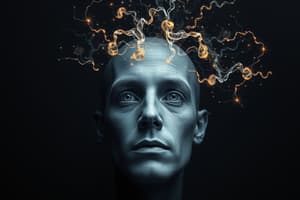Podcast
Questions and Answers
What did Socrates emphasize as crucial for personal development?
What did Socrates emphasize as crucial for personal development?
- Group consensus
- Financial stability
- Adapting to social situations
- Self-knowledge (correct)
According to Plato, which of these parts is NOT one of the three components of the self?
According to Plato, which of these parts is NOT one of the three components of the self?
- Appetite
- Desire (correct)
- Spirit
- Reason
What does the philosophical maxim 'Know thyself' imply according to Socratic teachings?
What does the philosophical maxim 'Know thyself' imply according to Socratic teachings?
- Introspection leads to wisdom (correct)
- Relying on others is essential for growth
- We should focus on material accomplishments
- Personal beliefs should be unquestioned
Which example best illustrates Socrates' approach to personal choices?
Which example best illustrates Socrates' approach to personal choices?
What is the ultimate goal of the harmony among the three parts of the self according to Plato?
What is the ultimate goal of the harmony among the three parts of the self according to Plato?
What does Plato's theory suggest about the parts of the soul?
What does Plato's theory suggest about the parts of the soul?
How did Aristotle's view differ from Plato’s regarding the relationship of body and soul?
How did Aristotle's view differ from Plato’s regarding the relationship of body and soul?
What implication does Toby's dancing have according to Aristotle's philosophy?
What implication does Toby's dancing have according to Aristotle's philosophy?
What concept did Augustine of Hippo emphasize about the self's relation to God?
What concept did Augustine of Hippo emphasize about the self's relation to God?
Which situation best illustrates Augustine's concept of the struggle within the self?
Which situation best illustrates Augustine's concept of the struggle within the self?
What did Descartes mean by the phrase 'Cogito, ergo sum'?
What did Descartes mean by the phrase 'Cogito, ergo sum'?
How did John Locke characterize the nature of the self?
How did John Locke characterize the nature of the self?
What concept is associated with David Hume's Bundle Theory?
What concept is associated with David Hume's Bundle Theory?
According to Locke, what is essential for maintaining a consistent personal identity?
According to Locke, what is essential for maintaining a consistent personal identity?
Which philosopher's view aligns with the belief that inner conflict influences moral choices?
Which philosopher's view aligns with the belief that inner conflict influences moral choices?
What does Hume suggest about the nature of the self?
What does Hume suggest about the nature of the self?
According to Kant, what does the inner self encompass?
According to Kant, what does the inner self encompass?
How does Kant differentiate between the inner self and the outer self?
How does Kant differentiate between the inner self and the outer self?
In the example of learning to play the piano, what role does the 'inner self' play according to Kant?
In the example of learning to play the piano, what role does the 'inner self' play according to Kant?
What aspect of Kant's philosophy relates to how others perceive us?
What aspect of Kant's philosophy relates to how others perceive us?
What is Paul Churchland's view on the self?
What is Paul Churchland's view on the self?
How does Maurice Merleau-Ponty differ from traditional views of the self?
How does Maurice Merleau-Ponty differ from traditional views of the self?
According to Churchland's example of Benedict learning guitar, what does this reflect about the self?
According to Churchland's example of Benedict learning guitar, what does this reflect about the self?
What aspect of the self does Merleau-Ponty focus on?
What aspect of the self does Merleau-Ponty focus on?
Which idea did both philosophers reject in their views of the self?
Which idea did both philosophers reject in their views of the self?
Study Notes
The Self from Philosophical Perspectives
-
Socrates emphasized self-knowledge with his maxim “Know thyself,” promoting introspection for true wisdom and personal growth.
-
Socratic dialogues, including "The Apology" and "The Phaedrus," exemplify self-examination focusing on character and choices.
-
Plato proposed that the self is immortal and consists of three parts: reason, spirit, and appetite, achieving harmony leads to virtue and a just society.
-
His ideas illustrate situations like cognitive struggle, where rationality guides decision-making, balancing desires with moral choices.
-
Aristotle rejected Plato’s Theory of Forms, arguing that the self comprises an inseparable body and soul, termed hylomorphism.
-
Through examples like dancing, Aristotle shows how physical expression conveys emotions and identity, unifying body and soul.
-
Augustine of Hippo viewed the self as interconnected with God, emphasizing spiritual longing and original sin as influencing personal fulfillment.
-
He highlighted moral conflicts impacting choices, such as honesty versus fear of consequences, reflecting inner character development.
-
René Descartes introduced dualism, distinguishing between the mind and body, asserting self-awareness confirms existence with his famous statement “Cogito, ergo sum” (I think, therefore I am).
-
The concept centers on the mind’s role in consciousness, as personal thinking validates existence and self-awareness.
-
John Locke described the self as a continuous chain of consciousness, shaped by memories and experiences, originating from a blank slate (Tabula rasa).
-
This perspective illustrates identity as evolving through life experiences, where retrospective reflection connects past with present self.
-
David Hume challenged the notion of a fixed self, proposing the Bundle Theory, asserting that identity is a collection of experiences and perceptions rather than a single entity.
-
His view suggests a dynamic sense of self that evolves throughout life, adapting with new experiences and insights.
-
Immanuel Kant distinguished between the inner self (transcendental) encompassing intellect and emotions, and the outer self (empirical) as physical presence and sensory interactions.
-
Kant’s framework helps understand learning experiences like playing the piano, balancing conscious thought and observable physical actions.
-
Paul Churchland introduced neurophilosophy, arguing the self is a construct of brain activity rather than an independent entity.
-
Changes in brain function influence self-perception and abilities, linking identity to cognitive processes.
-
Maurice Merleau-Ponty emphasized the connection between the self and physical body through sensory experiences, rejecting dualism.
-
Movement and interaction with the environment embody personal identity, suggesting that self is shaped through lived experiences.
Studying That Suits You
Use AI to generate personalized quizzes and flashcards to suit your learning preferences.
Description
Join us as we explore the multifaceted concept of the self through various philosophical lenses. This module takes you on a journey, examining how different thinkers have interpreted the nature of self-identity and existence. Get ready to engage with thought-provoking questions that challenge your understanding of who you are!




